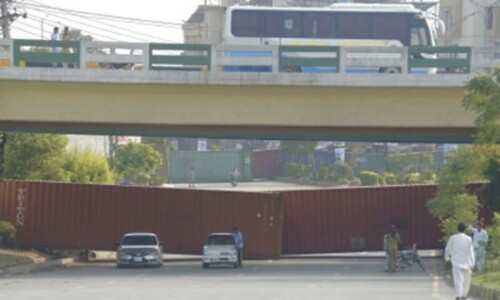RAWALPINDI: A significant number of participants present at the Jamaat-i-Islami (JI) sit-in at Liaquat Bagh have come from central and southern districts of Punjab and parts of Khyber Pakhtunkhwa, and many of them have vowed to resist the increase in power tariffs and heavy taxes imposed by the government in the federal budget.
As the protest entered its second day, Murree Road remained closed to traffic from Marrir Chowk to Committee Chowk, with containers placed on the artery that passes through the heart of the garrison city. As a result, business activities in the area were affected.
About 3,000 people, mostly workers, were present at the protest site in the morning, with the JI leadership conspicuous by its absence. Though the party had installed tents in the park for the protesters, the participants chose to occupy the road to register their protest.
Speaking to Dawn, Mohammad Anwar, a resident of Okara, said he had come to Rawalpindi to protest inflation which was unbearable for the masses. According to Mr Anwar, the JI supporters are divided into smaller groups of five to seven people and most of them have brought a few pairs of clothes. He, however, said they did not need sleeping bags because of the hot and humid weather.
“We can sleep anywhere in the park,” he said.
Bashir Ahmed from Bahawalnagar said he came here on the call of the JI leadership and his group comprised as many as 20 people. He said it was their duty to stage this protest against the back-breaking inflation and was planning to stay here for up to four days despite the hot weather.
To get some respite from the heat, the JI protester said he had been staying at a nearby mosque till the evening. He added the JI leadership was expected to decide about the protest by Sunday afternoon.
Participants complain about shortage of bathrooms, vow to stay put despite heat
Nisar Ali, a resident of Lahore, has been staying at Liaquat Bagh since Friday night.
Kabir Khan, a resident of Bannu, said that he along with his friends arrived in Rawalpindi to lodge a protest against inflation which the incumbent government was not capable of managing.
Sajjad Khan from Peshawar said a large number of “outsiders” were seen at the camp because some local workers were busy arranging logistics for the sit-in participants, whereas a large number had returned to their houses after attending the protest.
Some protesters complained about the problem their sit-in was facing; for instance, bathrooms.
“We have been using washrooms of the park, at nearby mosques, and even the metro bus stations of Marrir Chowk, Liaquat Bagh and Committee Chowk,” said Shahmir Hussain, adding that the number of these facilities was insufficient for such a large number of people.
For water, a stall had been set up by some philanthropists at Liaquat Bagh but mostly protesters were buying water from nearby shops and vendors who had installed their stands near the park, seemingly to cater to the needs of the protesters.
JI Rawalpindi leader Malik Azam said the local chapter of the political party was providing three meals a day to the participants. “We have also provided carpets [to the sit-in] with the help of local workers and supporters so the people can sit on the ground and offer their prayers without any problems,” he said.
The JI leader said the local supporters of the party were busy making arrangements for the protesters which is why their number was smaller compared to those who had come from other parts of the country.
Published in Dawn, July 28th, 2024














































Dear visitor, the comments section is undergoing an overhaul and will return soon.